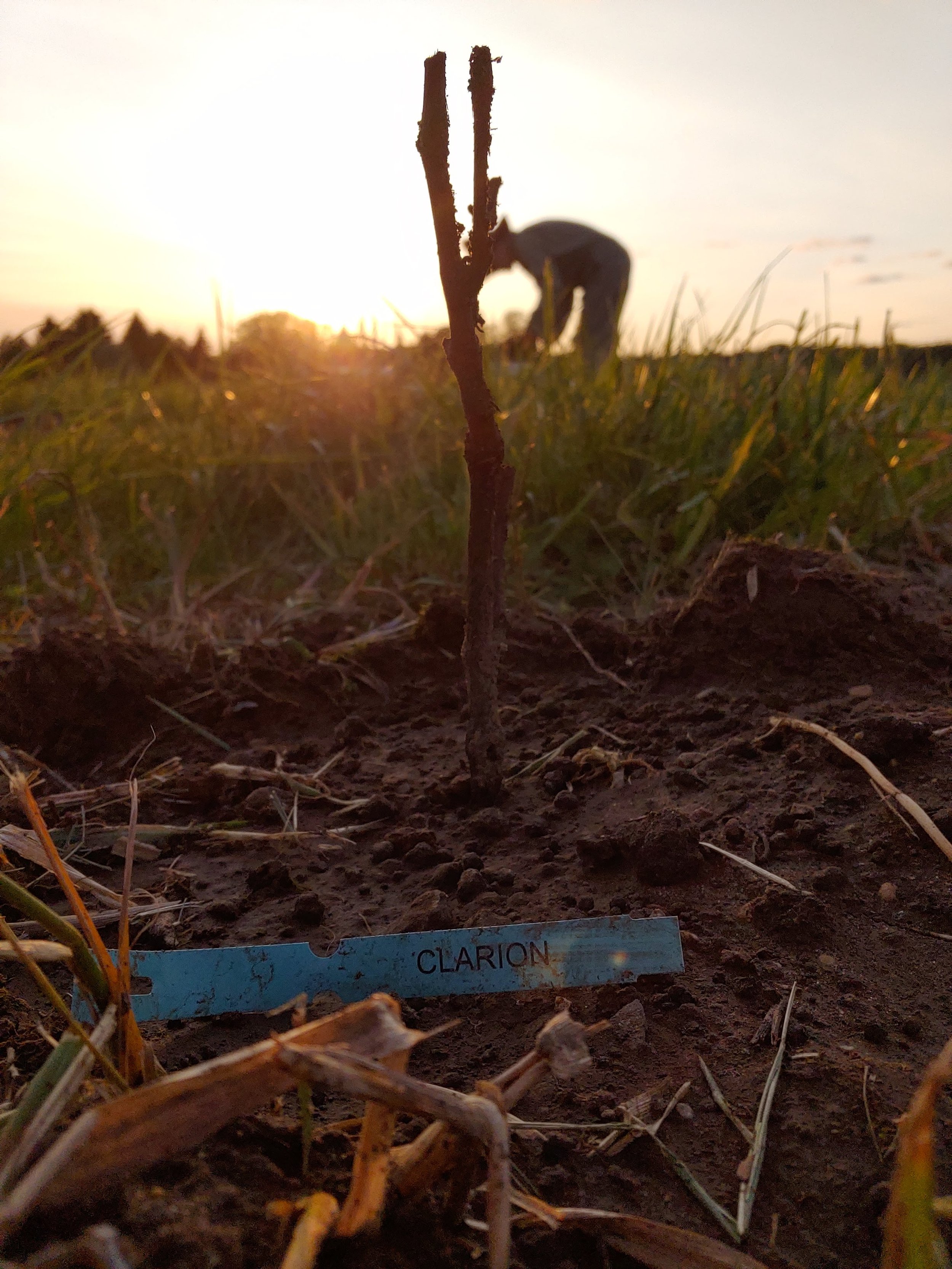
Local ingredients
While we agree that great wines are made in France and California and wherever else your favorites are from, we also know we have great wines here. (And meads, and ciders, etc.) We believe you don’t have to import exotic ingredients to produce world-class beverages, and we want to prove it to you. We want to extend people’s concept of “locally grown” from their plates to their glasses. Locally sourced means less shipping cost and impact. It means supporting local farmers and businesses. It means transparency in your supply chain. It means less middle-men. And it doesn’t mean loss in quality.
our vines
To produce great wines, you have to start with great fruit. All our grapes are sourced from the Wisconsin Ledge AVA. Once our young vineyard is fully producing, we aim to grow all of our own wines. We have two small vineyards of about 3 acres each, one in Egg Harbor and one in Sturgeon Bay. We grow several varietals including Itasca, L’Acadie Blanc, La Crescent, Clarion, Aldamina, and Crimson Pearl. Our younger vineyard in Sturgeon Bay is being established organically. At our Egg Harbor location, we don’t use irrigation, insecticides or synthetic fertilizers; our only non-organic practice is a fungicide we use to prevent disease and ensure a healthy harvest. We hope to slowly transition out of this to become fully organic in time. We believe in being transparent in our practices to build trust with our customers. We also know there is always room for improvement in any walk of life and are always open to change and adopting the most healthful practices available.
Hybrid Grapes
Hybrid grapes are the future of winemaking. There are thousands of species of grapes around the globe, yet most of our wines are only made from a few well-known varietals. This leads to large mono-crop style vineyards and a lot less diversity of choice for us wine drinkers. Hybrid grapes are naturally propagated varieties that are the culmination of decades of careful pollen crosses and field trials run by dedicated grape-breeders to select the best tasting grapes that are also the most resilient. The varieties we choose to grow are the ones best adapted to our region, meaning we get better quality fruit with lower inputs by us as growers which makes them by far the more sustainable choice. It also opens up opportunities to try new wines and experience new flavors. If you come across a grape you’ve never heard of, try it! It might become your new favorite wine.
wild/spontaneous/ pitched yeasts
We have a mixed strategy when deciding how to start our fermentations. Apple and cherry based wines are allowed to spontaneously ferment. It’s always a risk, since some yeasts do a better job and produce better flavors than others, but we have loved the wild yeasts coming in from the orchards so far!
All of our grape based wines use wild yeasts, too. However, here we do start inserting our preferences as winemakers by selecting our wild yeasts. Before harvest, we go into the vineyard, pick a few clusters of grapes, and leave them in the field in 5 gallon buckets with air-locks on top to start fermenting spontaneously. At harvest, we open them up. Any with off flavors or aromas we don’t want in the finished wine gets poured back into the dirt and the ones we like get pitched into the press to kick start the bulk fermentation.
Our meads are all started with a commercial yeast. Honey is tricky… it really doesn’t always want to be fermented. A jar of honey is shelf stable literally forever, so it takes a lot of coaxing to get it going the way we like. We are experimenting with wild yeast meads, but currently use a champagne yeast starter that keeps the character of the honey intact in a way we really like and gives our base meads delicate pollen and floral notes.
minimal intervention winemaking
We go to extremes to be true to our growing region and source the best quality ingredients we can. The last thing we want to do is mess them up. We believe in showcasing our terroir in our ferments by not doing very much to them in the cellar. Our wines and ciders are completely unfiltered, while our meads go through a light filtration before bottling. We use only whole ingredients, no flavorings or additives. The only methods we use to “alter” our wines are natural processes like barrel or bottle aging and a secondary ferment for our Champagne -style wines. Except for our Pét-Nat wines, we add sulfites at bottling to protect the carefully honed character of our wines and make sure they make it to you in good condition.
quality
While we appreciate our customers’ interest in what goes on behind the scenes, at the end of the day, we don’t want you to buy our wines for any of these reasons. We want you to buy them because you love them. Our commitment to quality is foremost in our minds at all times and we hope you appreciate all the thought and care that goes into why we do what we do, but we hope it’s that first sip that makes you fall in love and keeps you coming back for more. Thanks for raising a glass with us!






